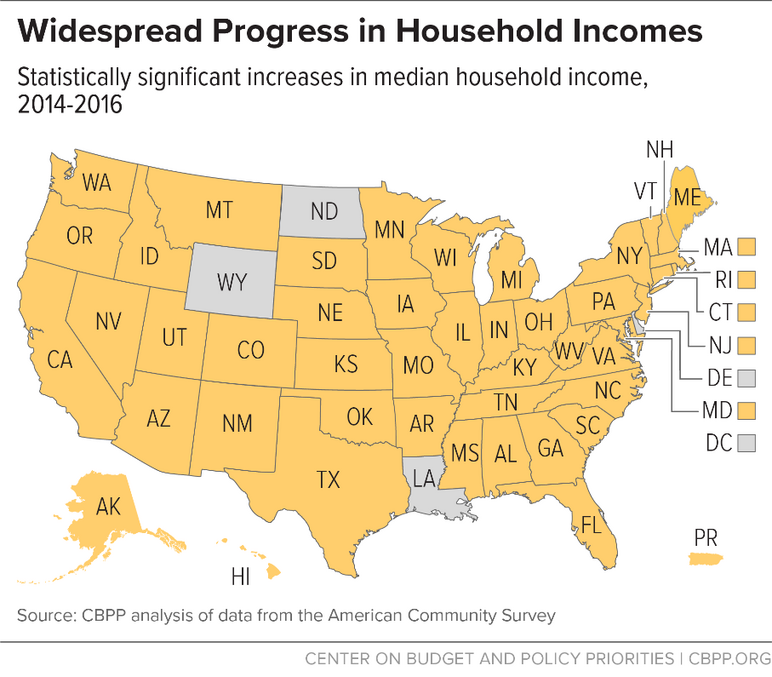BEYOND THE NUMBERS
The economy has fueled income gains across the states, yet Congress is considering proposals that would undermine them. As we reported Tuesday, incomes rose nationally more from 2014 to 2016 than in any other two-year period in five decades. Now, according to yesterday’s release of new American Community Survey data, we know that the gains were widespread. In fact:
- Median household income rose in 46 states and Puerto Rico from 2014 to 2016 (see map) and in 30 states plus Puerto Rico from 2015 to 2016. In a Washington Post op-ed, CBPP economist Jared Bernstein noted that a likely part of this story is the 2.2 million workers who moved into full-time, full-year work from 2015 to 2016, building on the 2.4 million who did so from 2014 to 2015.
- Higher household income reduced financial hardship for millions of struggling Americans. The share of people living below the official poverty line fell significantly in 37 states and Puerto Rico from 2014 to 2016, and in 24 states plus Puerto Rico from 2015 to 2016. Among other benefits, that means more children are having their needs met, which sets them up for a better future and generates long-term payoffs for the economy.
- Beyond these measures, and as my colleague Matt Broaddus reported, health coverage in the states continued to improve in 2016. Just 6.5 percent of people in the 31 states plus the District of Columbia that adopted the Affordable Care Act’s (ACA) Medicaid expansion by January 2016 lacked health insurance that year. That’s half of the uninsured rate in those states in 2013 before the ACA took full effect. (Progress has been less pronounced in states that haven’t expanded Medicaid, where the uninsured rate is now 11.7 percent.) That means fewer families are feeling the economic shocks of sudden illness or enduring the high costs of chronic health conditions.
Congress is considering proposals to repeal the ACA that would leave tens of millions more people uninsured, as well as budget and tax plans that would undermine key economic supports like working-family tax credits, food and housing assistance, and grants to states that help struggling communities. The progress of 2016 underscores that Congress should do more, not less, to strengthen economic security and opportunity for low- and moderate-income Americans, like raising the minimum wage and pursuing bipartisan improvements to the ACA.
State lawmakers can also further progress by bolstering public investments in things like more robust state earned income tax credits, higher state minimum wages, expanded child care and transportation assistance, and greater access to higher education and job training. These steps would broaden prosperity.

